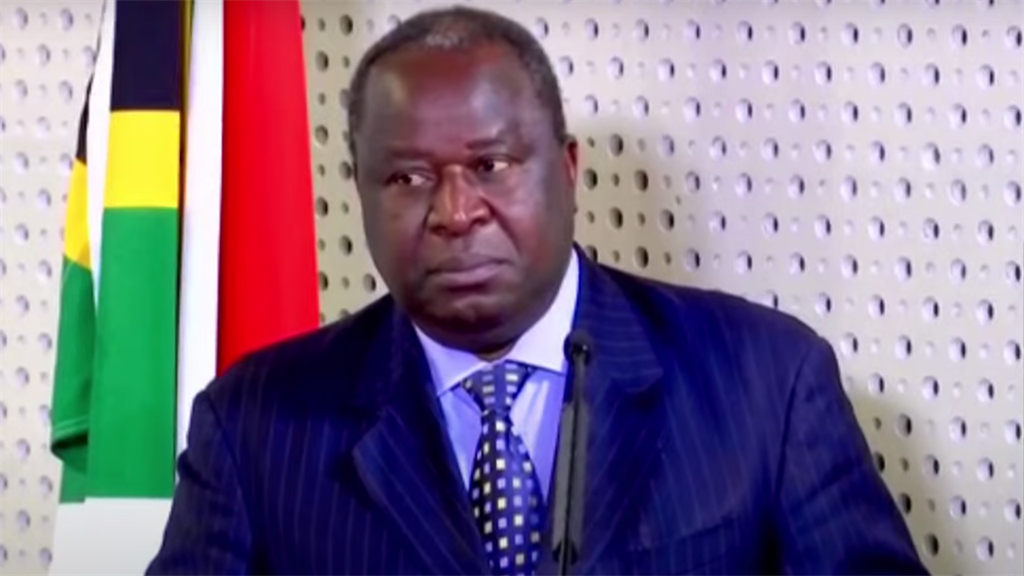


Finance minister Tito Mboweni delivering his coronavirus emergency budget. (Parliament of SA)
- The Auditor-General of South Africa presented a grim picture of municipalities’ financial management during the 2018-2019 financial year.
- Finance Minister Tito Mboweni, in his supplementary budget, said an additional R11 billion has been allocated to local government.
- MPs called for more stringent enforcement of accountability measures at municipalities.
Hours after the Auditor-General of South Africa (AGSA) told Parliament “the story of many dysfunctional municipalities” with “repeated accountability failures”, Finance Minister Tito Mboweni announced that an additional R11 billion will be allocated to municipalities.
Mboweni made the announcement when he delivered his supplementary budget.
On Wednesday morning, the National Council of Provinces (NCOP) received a report about the audit outcomes for municipalities in the 2018-2019 financial year, titled “Not much to go around, yet not the right hands at the till”.
Of South Africa’s 257 municipalities, only 20 (8%) managed to achieve clean audits in 2018-2019, while 33 (13%) got disclaimed with findings, and 28 municipalities’ audit findings were outstanding.
Deputy Auditor-General Tsakani Maluleke described the report as “the story of many dysfunctional municipalities” and said it illustrated “repeated accountability failures”.
Collectively, R2.07 billion of municipalities’ expenditure was fruitless and wasteful, R11.98 billion was unauthorised, and annual irregular expenditure increased from R25.2 billion to R32.06 billion.
READ | Mboweni squeezes out more money for municipalities to fight Covid
Hours later, Mboweni presented his supplementary budget, in response to the Covid-19 pandemic to the National Assembly, and announced that local government’s allocation from the equitable share increases from R133 billion to R140 billion.
“Local government is at the heart of our response to the pandemic. Accordingly, an additional R11 billion is allocated to local government through the equitable share. A further R9 billion will be reprioritised within allocated conditional grants to fund additional water and sanitation provision, and the sanitisation of public transport,” he said.
“Municipalities will adjust their budgets to take into account the sharp decline in revenue as a result of the pandemic. We urge communities to hold councils accountable for the spending of Covid-19 funds.”
He said National Treasury will also monitor the municipalities’ spending through monthly and quarterly reports.
In reaction to the budget, IFP spokesperson on finance Nzamo Buthelezi said it was “incredibly unfortunate” that the “shocking audit outcomes” were released on the same day as the budget.
“While the increase for local government expenditure is welcomed and a relief to struggling municipalities, the state of health of financial management at our local government entities and councils is worrisome and leaves a lot to be desired,” Buthelezi said.
READ | Devastation for SA economy but much ado about nothing for the rand
He said the Department of Cooperative Governance and Traditional Affairs must put in place resources and human infrastructure to manage finances accordingly and to cut out corruption.
After AGSA’s briefing, the chairperson of the Select Committee on Cooperative Governance and Traditional Affairs, Water and Sanitation and Human Settlements, China Dodovu, called for clear consequence management in errant municipalities with negative audit outcomes for the 2018-2019 financial year.
He said, according to a statement: “There is a serious problem here. Are we going to sit with the Auditor-General again next year and raise the very same problems if there is no concomitant action taken against anybody who is responsible for the financial mess in the municipalities?
“Last year, the same problems were raised, and among them is the deteriorating accountability and lack of consequence management, a point that is highlighted today. If we don’t put a stop to this, next year we are going to face the same problems.”
The Select Committee will urgently meet and discuss the report, and will make recommendations to the NCOP as a way of finding solutions to the continuing worrying trend of negative audits.

